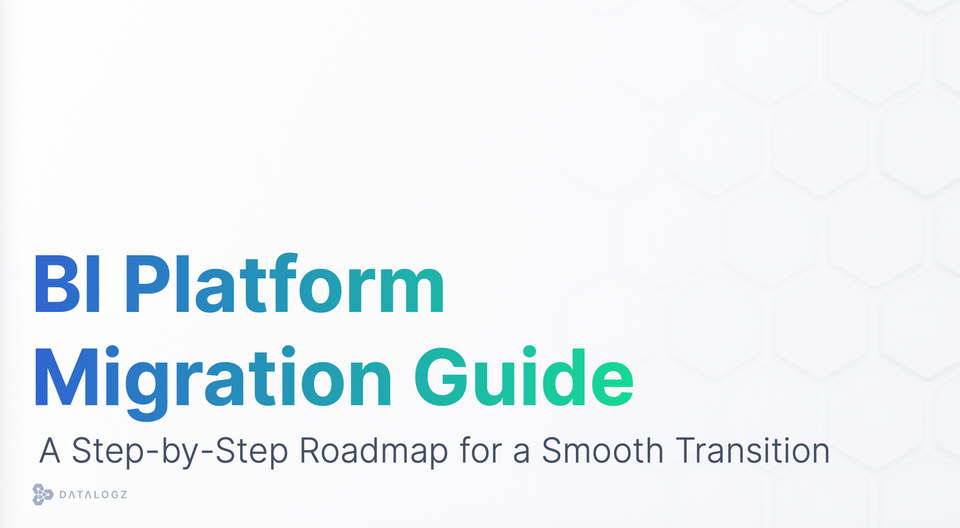Importance of BI Ops for Data-Driven Decision-Making
BI Ops plays a critical role in data-driven decision-making by providing the right data and insights to make informed decisions.

Investing in BI Ops is indispensable for organizations leveraging data-driven decision-making to drive growth and increase profitability. BI Ops creates the guardrails that make enterprise-wide BI initiatives successful. Fundamentally, it is a set of processes and technologies that enable you to be successful with your BI initiatives.
Data has become an essential resource in today's fast-paced business environment, and organizations must have the right tools and processes to make informed decisions. BI Ops is crucial in providing these tools and processes, enabling organizations to leverage data to identify opportunities, mitigate risks, and improve business performance.
The Role of BI Ops in Data-Driven Decision-Making
BI Ops is critical to data-driven decision-making by providing the correct data and insights to make informed decisions. It enables decision-makers to identify trends, patterns, and relationships in data to help them make better decisions.
BI Ops also allows organizations to automate their data workflows, reducing the time and effort required to collect, transform, and analyze data. This automation ensures decision-makers can access the latest information, enabling them to respond quickly to changing market conditions and customer needs.
Key Components of BI Ops
BI Ops comprises several critical components, including data integration, data quality, and data governance.
Data integration involves combining data from various sources, transforming it into a consistent format, and loading it into a centralized database. This process enables decision-makers to analyze data from multiple sources, providing a complete picture of the organization's performance.
Data quality ensures that the data is accurate, complete, and consistent. It involves identifying and correcting errors in data and ensuring that the data meets the organization's quality standards. High-quality data is essential for making informed decisions, and BI Ops helps ensure the data is reliable and trustworthy.
Data governance involves the policies, procedures, and standards for managing data across the organization. It ensures data is managed appropriately, following best practices and legal requirements. Data governance is critical for ensuring data is used ethically and responsibly, and BI Ops helps ensure that data governance policies are followed.
Challenges in Implementing BI Ops
Implementing BI Ops can be challenging for organizations with complex data environments. Organizations' common challenges when implementing BI Ops include data silos, lack of collaboration, and insufficient data literacy.
Data silos occur when data is stored in separate systems or departments, making it difficult to integrate and analyze data across the organization. It can result in incomplete or inaccurate data, leading to poor decision-making.
Lack of collaboration can occur when decision-makers are not working together, leading to fragmented decision-making processes. It can result in decisions not aligning with the organization's goals or strategies.
Insufficient data literacy can occur when decision-makers do not have the necessary skills or knowledge to use data effectively. It can lead to misinterpretation of data, leading to poor decision-making.
Best Practices for Implementing BI Ops
To overcome these challenges, organizations should adopt best practices for implementing BI Ops, including:
Building a solid data foundation: This involves ensuring that data is accurate, complete, and consistent. Organizations should invest in tools and processes to ensure that data is reliable and trustworthy.
Promoting data literacy: Organizations should invest in training and education to ensure decision-makers have the necessary skills and knowledge to use data effectively. It can include training on data analysis tools, statistical methods, and data visualization techniques.
Using agile methodologies: Agile methodologies enable organizations to respond quickly to changing business needs, allowing them to adapt their data workflows and analytics processes as required.
Ensuring collaboration: Organizations should encourage collaboration between decision-makers and stakeholders, ensuring everyone is aligned with the organization's goals and strategies.
In today's fast-paced business environment, data-driven decision-making has become essential for organizations to stay competitive. BI Ops provides decision-makers with the correct data and insights to make informed decisions, automate data workflows, and ensure data quality and governance.
Implementing BI Ops can be challenging, but organizations can overcome these challenges by adopting best practices, such as building a solid data foundation, promoting data literacy, using agile methodologies, and ensuring collaboration.
The benefits of BI Ops are significant and can help organizations improve their business performance, identify opportunities, and mitigate risks. By leveraging data-driven decision-making, organizations can make better decisions, reduce costs, increase profitability, and achieve their business objectives.
In conclusion, BI Ops is essential for organizations leveraging data-driven decision-making to drive growth and increase profitability. By adopting best practices and overcoming common challenges, organizations can build a strong data foundation, promote data literacy, and ensure collaboration, enabling them to make informed decisions and achieve their business objectives.



